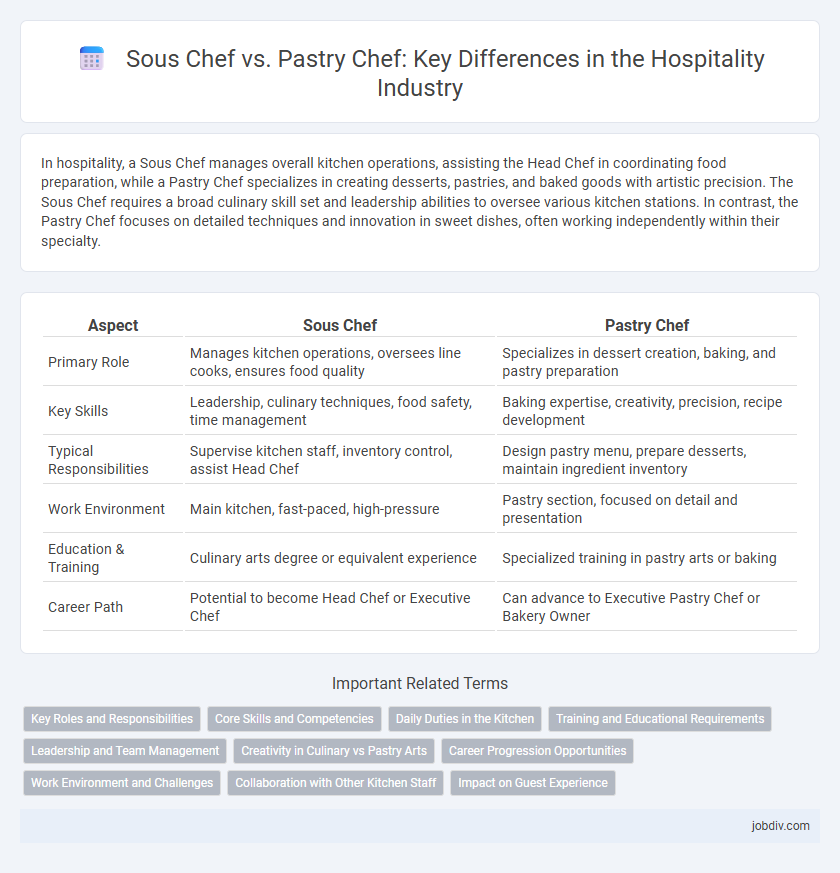In hospitality, a Sous Chef manages overall kitchen operations, assisting the Head Chef in coordinating food preparation, while a Pastry Chef specializes in creating desserts, pastries, and baked goods with artistic precision. The Sous Chef requires a broad culinary skill set and leadership abilities to oversee various kitchen stations. In contrast, the Pastry Chef focuses on detailed techniques and innovation in sweet dishes, often working independently within their specialty.
Table of Comparison
| Aspect | Sous Chef | Pastry Chef |
|---|---|---|
| Primary Role | Manages kitchen operations, oversees line cooks, ensures food quality | Specializes in dessert creation, baking, and pastry preparation |
| Key Skills | Leadership, culinary techniques, food safety, time management | Baking expertise, creativity, precision, recipe development |
| Typical Responsibilities | Supervise kitchen staff, inventory control, assist Head Chef | Design pastry menu, prepare desserts, maintain ingredient inventory |
| Work Environment | Main kitchen, fast-paced, high-pressure | Pastry section, focused on detail and presentation |
| Education & Training | Culinary arts degree or equivalent experience | Specialized training in pastry arts or baking |
| Career Path | Potential to become Head Chef or Executive Chef | Can advance to Executive Pastry Chef or Bakery Owner |
Key Roles and Responsibilities
Sous Chefs oversee kitchen operations, manage staff, and ensure timely preparation of savory dishes, maintaining quality and hygiene standards. Pastry Chefs specialize in creating desserts, pastries, and baked goods, focusing on precise measurements and artistic presentation. Both roles require strong culinary skills but differ in scope, with Sous Chefs handling broader kitchen management and Pastry Chefs concentrating on specialized dessert production.
Core Skills and Competencies
Sous chefs demonstrate expertise in kitchen management, menu planning, and savory cooking techniques, excelling in leadership and multitasking under pressure. Pastry chefs specialize in precise measurements, artistic presentation, and advanced baking sciences, requiring creativity and attention to detail for desserts and baked goods. Both roles demand strong time management, teamwork, and a deep understanding of food safety standards within a high-paced hospitality environment.
Daily Duties in the Kitchen
Sous chefs oversee daily kitchen operations, coordinating food preparation, supervising kitchen staff, and ensuring quality control across all dishes. Pastry chefs specialize in creating desserts, breads, and pastries, focusing on precise measurements, baking techniques, and artistic presentation. Both roles require time management, inventory monitoring, and maintaining hygiene standards, but their core duties differ in culinary scope and specialization.
Training and Educational Requirements
Sous chefs typically require formal culinary education, such as a degree or diploma from a culinary school, combined with extensive kitchen experience in various cooking techniques and management skills. Pastry chefs often pursue specialized training focused on baking, pastry arts, and dessert preparation, commonly obtained from dedicated pastry schools or through apprenticeships. Both roles demand hands-on experience, but pastry chefs emphasize precision in measurement and artistry, while sous chefs must master a broader range of cooking methods and leadership duties.
Leadership and Team Management
A Sous Chef directs kitchen operations and ensures seamless coordination among culinary stations, cultivating leadership through delegation and real-time decision-making. The Pastry Chef leads a specialized team focused on dessert creation, emphasizing precision, creativity, and meticulous team training to maintain quality standards. Both roles demand strong communication skills and the ability to motivate staff, but the Sous Chef manages broader kitchen dynamics while the Pastry Chef hones expertise in a niche discipline within the hospitality industry.
Creativity in Culinary vs Pastry Arts
Sous chefs excel in culinary creativity by innovating flavors, techniques, and presentations in savory dishes, driving the kitchen's overall artistic direction. Pastry chefs showcase their creativity through precise, artistic dessert construction, incorporating textures, colors, and intricate decorations to delight the palate and eyes. Both roles demand exceptional skill and imagination but differ in their focus on savory versus sweet culinary artistry.
Career Progression Opportunities
Sous chefs often advance into executive chef roles by mastering kitchen management and diverse culinary techniques, gaining broad leadership experience in savory cooking. Pastry chefs typically progress towards roles such as pastry chef de cuisine or culinary director specializing in desserts, requiring deep expertise in baking and patisserie innovation. Both career paths offer opportunities for specialization, management, and entrepreneurship within the hospitality industry.
Work Environment and Challenges
Sous Chefs primarily operate in high-pressure, fast-paced kitchen environments where they oversee food preparation and coordinate with culinary teams to maintain quality and timing. Pastry Chefs work in more specialized settings, such as patisseries or dedicated dessert stations, requiring precision, creativity, and meticulous attention to detail in baking and dessert presentation. Both roles face challenges including long hours, consistency under pressure, and adapting to evolving culinary trends, but Pastry Chefs often encounter the added challenge of balancing artistry with strict recipe adherence.
Collaboration with Other Kitchen Staff
Sous chefs coordinate closely with line cooks, grill chefs, and other kitchen staff to ensure smooth meal preparation and timely service. Pastry chefs collaborate with bakers and dessert station staff to maintain consistency in sweet offerings and presentation. Both roles require effective communication and teamwork to achieve a harmonious kitchen environment and high-quality culinary output.
Impact on Guest Experience
Sous Chefs elevate guest experience by ensuring seamless kitchen operations, timely dish preparation, and maintaining high culinary standards across savory menus. Pastry Chefs enhance guest satisfaction through creative dessert presentations, unique flavor combinations, and consistent quality in baked goods. Both roles significantly contribute to a memorable dining experience by balancing savory excellence with indulgent pastries.
Sous Chef vs Pastry Chef Infographic

 jobdiv.com
jobdiv.com